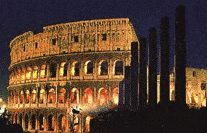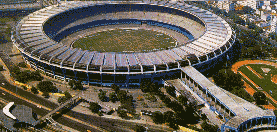
This impressive view of the Coliseum, powerfully illuminated by spotlights, allows us to see the same diverse beauties the old monument displays when under the brightness of the Roman sun.
An atmosphere of tragedy and catastrophe weighs heavily over the ambience. To the right, in the background the collapsed walls of the Coliseum can be seen. In the foreground, two columns from another ruin raise up against the dark sky, one severed and the other completely useless, like a mute protest, defeated but persevering against the outrages of the centuries. Within this completely transformed ambience, the walls still standing even more poignantly emit this impression of persistence, survival, and an age-old maintenance of a spirit and tradition now dead. The twentieth century affirms itself through the light from the spotlights (the candelabrums of public lighting) and the damp tire-marked asphalt. However, the Coliseum’s harmonious, imposing, and solemn mass, simultaneously light monumental, makes us feel in the modern ambience all the nobility, dignity, and power of the Empire. We can sense all the elevation, vitality, and logic of the Roman spirit, which had law as its ideal. All this was is destroyed. The only sign of life in the Coliseum is the still-warm blood of the martyrs.
However, in this ruin, there is an attraction that extends even to the farthest corners of the earth. Tourists flock to these ruins from the most remote regions. Thus, a grand ideal of beauty still shines in these dead stones.
Tout Passe, tout casse, tout lasse et tout se remplace.(Everything passes, everything breaks, everything wears out and everything gets replaced.)

Only the Church endures in this world. The Coliseum fell. One day the Maracaná Stadium can fall. And its ruins? What impression will they leave? If any ruins are left.
The parts of a homogeneous whole cannot be worth more than the whole. If the night lighting of the Coliseum shows all its grandeur, an aerial photograph of the Maracaná Stadium exposes all its defects. One could call it a piece of machinery – banal, crude, soulless piece of modernity, crammed with thousands of ant-like spectators. This stadium expresses a different worldview. It does not reflect law like Rome, or philosophy like Greece, and much less theology like the eighteenth century. It reflects the ideal of the machine.
The machine or, as it were, matter. Materialistic souls, materialistic mechanized men is reflected in the Maracaná Stadium as in so many others of its kind.
Will people visit its ruins one day? Perhaps…they will visit to understand how our civilization collapsed, shake their heads, and continue their course, reflecting on the justice of God.
The preceding article was originally published in the June, 1954 issue of Catolicismo (No.42). It has been translated and adapted for publication without the author’s revision. –Ed.

